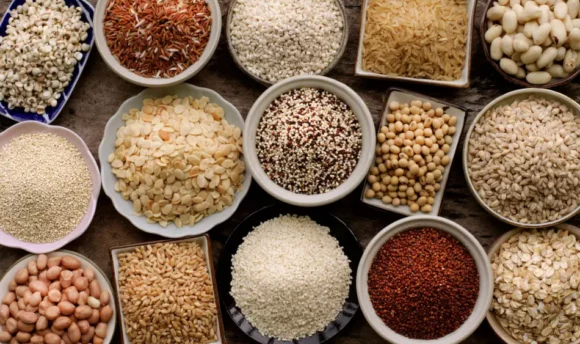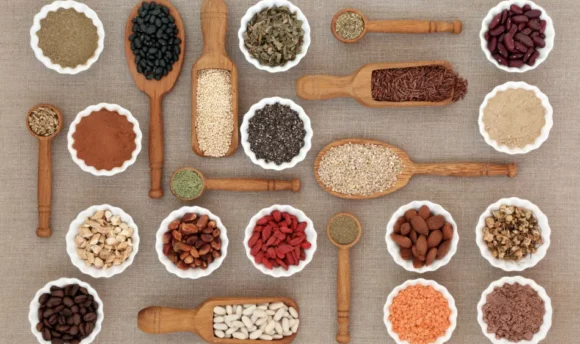Plant-Based vs. Vegan: What Is the Difference?
Cutting animal products out of your diet is a great way to enjoy better health benefits and reduce your risk of cardiovascular disease. Two common terms used in this sphere are plant-based and vegan – but are they the same thing? We find that out here.

Every year, more people opt to eliminate or reduce the number of animal foods they consume in their diet. Due to this, many plant-based foods are becoming available in restaurants, grocery stores, fast-food chains, and public events.
With this increase, you may have heard people labeling themselves plant-based, whereas others prefer to call themselves vegans. This has led to much confusion – are they the same thing, or are there any differences?
Below, we will take a look at what is meant by a plant-based diet and a vegan diet to see their differences and similarities when it comes to lifestyle and dietary terms. So let’s get right to it!
Plant-Based vs. Vegan – Is It the Same Thing?
The simple answer is no. While both plans eliminate meat, fish, and chicken from their diet, a plant-based diet does not necessarily eliminate animal products in totality. Plant-based diets focus on eating plant products, such as vegetables, fruits, seeds, nuts, and whole grains.
Vegan diets eliminate all animal products, including dairy and eggs. A vegan diet consists of products derived wholly from plants alone. This diet contains only vegetables, grains, nuts, and fruits.
Although both of these diets have their similarities, a plant-based diet is way less restrictive as you can still consume products that are not allowed if you are vegan. Veganism is also a lifestyle rather than only a diet because most people choose this diet for ethical reasons and animal welfare.
Both diets have benefits for your health. If you are struggling with high blood pressure and high cholesterol levels, try following any plant-based diet. The Cardi.Health app is ready to offer you personalized nutrition and activity plans based on your current blood pressure and cholesterol measurements.
What Does Plant-Based Mean
A plant-based diet allows you to choose whether you want to include a small number of animal products, like honey, milk derivatives, cheese, and eggs, in your diet. However, most of the foods you eat will be from whole food plant sources.
A plant-based lifestyle typically also promotes eating whole plant foods, which means the food has undergone very little to no processing, keeping it in as natural a state as possible to enjoy the health benefits involved.
Being on a plant-based diet normally refers to a person’s diet alone, indicating that they eat mostly or only plant foods. But you can be plant-based and still consume some animal-derived products, although this does not include eating the flesh of any living animal.
What Is a Vegan Diet
Vegan diets do not include any animal products, including meat, dairy, poultry, eggs, fish, and honey. Many people choose a vegan diet for health, environmental, or ethical reasons.
However, it is important to note that just because a food is vegan doesn’t make it healthy. Vegans can technically eat any food that does not contain an animal product, such as cookies, fries, potato chips, and other junk foods that are often low in nutrients and high in calories, sugar, and fat.
Just because an animal was not killed or exploited to make the foods that vegans eat does not necessarily make vegan food healthy. It is important to remember that being vegan does not make the food good for you.
Additionally, most people who choose to be vegan will eliminate any products from their lives that have been tested on or made from animals. This includes shoes, makeup, household products, and clothing. It can also mean that some vegans may avoid immunizations and medications that use any animal byproducts.
Differences Between Plant-Based vs. Vegan
We mentioned above that the biggest difference between a plant-based diet and a vegan diet is that a plant-based diet may allow for some consumption of animal products, whereas vegan diets do not include any animal products at all but can include processed plant foods.
Additionally, vegan diets normally exceed the food side of things and branch into ethical reasons. This means that vegans will usually avoid any products, including foods, clothing, cosmetics, shoes, etc., that use animal products in any way.
Another big difference is that a plant-based diet can include variations such as pescatarian and flexitarian diets. These are still diets where plant foods are the focus but do include foods like fish, seafood, eggs, and occasional meat consumption.
Many plant-based diets are more reflective of vegetarian diets in their allowances. But vegetarian diets will include eggs and dairy products on a daily or semi-daily basis.
Vegan and vegetarian diets are also often confused, but as we have covered, a vegan diet includes no animal products at all, whereas vegetarian diets allow for eating animal products. They may be, however, combined with other diets, like vegan keto or paleo.
Similarities of Plant-Based and Vegan Diets
The biggest similarity is that plant-based and vegan diets exclude meat, fish, and poultry and focus more on whole foods. But other than that, there are only a few other similarities and health benefits.
Both plant-based and vegan diets are high in fiber, which assists with a healthy digestive system and good gut health.
Studies have also found that they can also both assist in lowering blood pressure, controlling blood sugar levels, reducing cholesterol levels, decreasing the risk of type 2 diabetes, and reducing stress.
Lastly, they are both great for the environment and the planet. Removing animal products from your diet reduces carbon emissions, water use, and greenhouse gases.
What Does a Plant-Based Diet Look Like
Eating a vegetable-based diet does not have to be difficult. It includes healthy fats and whole-food options like fruits and vegetables and limits animal proteins (if you choose to include them at all). To get all of the essential nutrients your body needs, eating a well-rounded diet is critical.
Breakfast can be anything from a smoothie made with bananas and other fruits, green vegetables, and plant milk to a heaping bowl of oatmeal topped with seeds and nuts and seasonal fresh fruit.
Lunch and dinner can be interchanged, but many health benefits can be enjoyed by having a soup and salad for lunch. The salad can include everything from lettuce, tomatoes, cucumber, peppers, and olives to beans, grains, potatoes, and rice.
You could also opt for something warm, make your own warm hummus and serve that with plant-based pasta, topped with mushrooms and onions.
With dinner, the sky is the limit. You can go for a burrito filled with beans, rice, lettuce, tomato, cucumbers, peppers, and any other vegetables you love. You could have a lentil cottage pie made with lentils, tomatoes, peppers, corn, carrots, and other vegetables, served with mashed potato.
FAQs
Yes, you can eat eggs on a plant-based diet. As we covered, the difference between a plant-based and a vegan diet is animal-based food. The vegan diet eliminates any foods that involve animals, opting for animal-free alternatives instead.
Plant-based diets simply focus more on plant-based foods. This means that if you really aren’t willing to give up eggs in your diet, you can have them. The downside to eggs is the higher levels of cholesterol they contain. But they do contain antioxidants and fat-soluble vitamins too.
No, it doesn’t always mean that. Plant-based diets don’t necessarily eliminate animal products from the eating plan. This means that dairy products like milk, cheese, cream, butter, and yogurt can be included if you wish.
However, if you are following a whole food plant-based diet, you cannot have these products as they are not considered whole foods since they require processing to be consumed.
As the name suggests, raw vegans consume a vegan diet that consists of foods in their raw state. They do not cook any foods at temperatures higher than 118° F or 48° C, which means they primarily include fruits and vegetables, seeds, and nuts.
Some grains and beans can also be consumed and are “cooked” by soaking them for extended periods.
No, it doesn’t. While plant-based diets typically try to limit animal products and meat as much as possible, there is no limitation as to whether or not you can eat meat.
However, whole food plant-based diets exclude meat and animal foods in totality and processed foods such as oils and crisps.
Many people who follow a plant-based diet choose to state that they follow a vegetarian diet as this is what it has most commonly been referred to as. A vegetarian diet includes no meat, fish, or poultry but can include animal products like eggs or milk.
A Word From Our Nutritionist
Deciding which diet to follow comes down to your beliefs and goals. If you want to eliminate animal foods from your diet for the sake of animal welfare and environmental reasons, the vegan diet is what you are looking for.
On a vegan diet, you will eat mostly plants and whole grains, but you can include processed foods such as vegan meat substitutes, packaged snacks, refined sugar, and oils.
Plant-based eating is a great way to go if you want the benefits of vegan and vegetarian diets but are not doing it because of environmental or animal welfare reasons.
Eliminating processed foods and eating more plant foods and whole grains will allow you to reap many health benefits, including lower blood pressure, blood sugar, and cholesterol, lower risk of heart disease, and certain cancers.
Many people choose a vegetarian diet as this allows more flexibility in their eating plans – they can follow a healthy diet that lowers their risk of various health issues, but they can still include some animal products in their diets.
Conclusion
More people worldwide are reducing or cutting out animal products from their diets. But this has led to some confusion about the terms plant-based and vegan.
As we covered above, plant-based diets consume limited or no animal foods and focus more on whole foods. A vegan diet exceeds dieting and is almost more about the lifestyle, avoiding animal products in food, cosmetics, clothing, and other products.
They are fundamentally different in their ideology and some food differences, but they share many similarities and health benefits. If you are looking to feel the full impact of your vegan or plant-based diet, you can easily use the Cardi.Health app to track your needs based on your condition (diabetes, cholesterol, high blood pressure, etc.).

















































 Select your language:
Select your language: 








